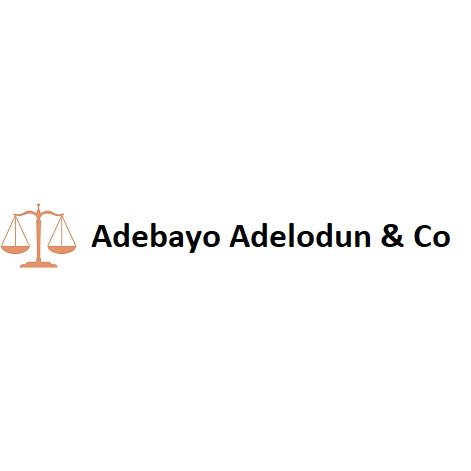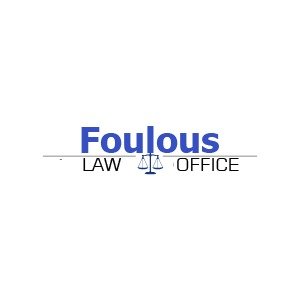Best Restructuring & Insolvency Lawyers in Ilorin
Share your needs with us, get contacted by law firms.
Free. Takes 2 min.
List of the best lawyers in Ilorin, Nigeria
About Restructuring & Insolvency Law in Ilorin, Nigeria
Restructuring and insolvency law in Ilorin, Nigeria is designed to help individuals and companies that are facing financial distress. Whether you are a business owner grappling with mounting debts or an individual struggling to repay personal loans, these laws provide mechanisms for dealing with unmanageable financial obligations. The laws also protect the rights of creditors while giving debtors a chance to reorganize their affairs or liquidate assets in an orderly manner.
In Ilorin, as in the rest of Nigeria, restructuring refers to the process of reorganizing a company’s financial and operational structure in order to restore its viability and maintain business operations. Insolvency refers to the legal process that is initiated when a company or individual is unable to pay their debts as they become due. These processes are governed by federal legislation, but local courts and professionals play a key role in their implementation within Ilorin.
Why You May Need a Lawyer
There are several situations where you may require a lawyer’s assistance in restructuring and insolvency matters. If your business is unable to service its debts and you are considering restructuring or voluntary liquidation, legal counsel can guide you through the complex legal requirements and documentation. If creditors are pursuing you or your company aggressively, a lawyer can help protect your interests and ensure fair treatment under the law.
Other common circumstances include disputes with creditors or debtors, negotiating repayment plans, representing your interests during insolvency proceedings, and ensuring compliance with relevant laws and regulations. Having legal representation ensures that you make informed decisions at each step, minimizes potential liabilities, and increases the chances of a successful outcome for all parties involved.
Local Laws Overview
Restructuring and insolvency in Ilorin, Nigeria is primarily guided by the Companies and Allied Matters Act (CAMA) 2020 and the Bankruptcy Act, which set the framework for administration, liquidation, and bankruptcy proceedings. The Central Bank of Nigeria and the courts also issue relevant guidelines and rulings.
Key aspects include:
- Appointment of insolvency practitioners (often lawyers or accountants) to manage the process.
- Provisions for company voluntary arrangements, administration, and forced liquidation.
- Protection of debtor and creditor rights during insolvency proceedings.
- Requirement for public notice and court involvement for certain actions.
- Debt recovery options for unsecured and secured creditors.
- Specific rules governing the distribution of assets in liquidation.
Ilorin’s courts have jurisdiction over cases relating to individuals and businesses domiciled or operating within Kwara State, making it essential to understand both federal statutes and local judicial practices.
Frequently Asked Questions
What is the difference between restructuring and insolvency?
Restructuring refers to measures taken to reorganize a company’s finances or operations to avoid insolvency, while insolvency is the legal state where a person or company cannot pay their debts when due.
Can an individual file for bankruptcy in Ilorin, Nigeria?
Yes, individuals can file for bankruptcy under the Bankruptcy Act if they are unable to meet their financial obligations.
What happens when a business is declared insolvent?
When a business is declared insolvent, its assets are managed or liquidated, outstanding debts are paid according to priority, and the business may either be reorganized or closed down.
What is a company voluntary arrangement?
A company voluntary arrangement is a formal proposal by an insolvent company to its creditors, seeking agreement to pay part or all of its debts over an agreed period of time while allowing the company to continue trading.
Who can act as an insolvency practitioner in Ilorin?
Usually, qualified lawyers and accountants with relevant experience in insolvency matters are appointed as insolvency practitioners by the courts or creditors.
Are creditors protected during insolvency proceedings?
Yes, insolvency law outlines creditor rights, including fair treatment, participation in meetings, and entitlement to a share of the debtor’s remaining assets.
How long does insolvency or restructuring typically take?
The duration varies depending on the complexity of the case, the method chosen, and the level of creditor agreement, ranging from several months to a few years.
Can directors be held personally liable in insolvency situations?
Directors can be held personally liable if they are found to have engaged in wrongful or fraudulent trading, or failed to act in the best interest of creditors when insolvency was apparent.
Can a creditor force a company into liquidation?
Yes, if a company defaults on its debts, a creditor may petition the court to wind up the company and initiate liquidation proceedings.
What are my options if my business is struggling financially in Ilorin?
You should seek legal advice immediately to evaluate options such as restructuring, negotiation with creditors, voluntary arrangements, or, if necessary, formal insolvency proceedings.
Additional Resources
If you are seeking further help or information, you may contact or consult with the following:
- Kwara State High Court for filings and hearings related to insolvency.
- Corporate Affairs Commission (CAC) for corporate restructuring procedures and filings.
- Nigerian Bar Association, Ilorin Branch for referrals to experienced restructuring and insolvency lawyers.
- Kwara State Ministry of Justice for guidance on legal rights and procedures.
- Central Bank of Nigeria for regulations relating to financial institutions and insolvency.
Next Steps
If you or your business is facing financial difficulties in Ilorin, it is crucial to seek professional legal advice as early as possible. Start by gathering all relevant financial documents and preparing a summary of your debts and assets. Consult with a reputable lawyer or insolvency practitioner who is familiar with local and federal laws. They will assess your situation, explain your options, and guide you through the right legal processes. Early action can preserve more options and potentially lead to a better outcome for everyone involved.
Lawzana helps you find the best lawyers and law firms in Ilorin through a curated and pre-screened list of qualified legal professionals. Our platform offers rankings and detailed profiles of attorneys and law firms, allowing you to compare based on practice areas, including Restructuring & Insolvency, experience, and client feedback.
Each profile includes a description of the firm's areas of practice, client reviews, team members and partners, year of establishment, spoken languages, office locations, contact information, social media presence, and any published articles or resources. Most firms on our platform speak English and are experienced in both local and international legal matters.
Get a quote from top-rated law firms in Ilorin, Nigeria — quickly, securely, and without unnecessary hassle.
Disclaimer:
The information provided on this page is for general informational purposes only and does not constitute legal advice. While we strive to ensure the accuracy and relevance of the content, legal information may change over time, and interpretations of the law can vary. You should always consult with a qualified legal professional for advice specific to your situation.
We disclaim all liability for actions taken or not taken based on the content of this page. If you believe any information is incorrect or outdated, please contact us, and we will review and update it where appropriate.

















